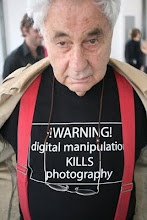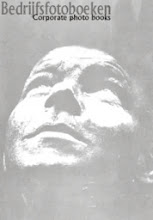
Paradiso Stills by Max Natkiel
Paradiso, Amsterdam’s pop-temple in Leidsplein, which once stood for flower-power, was stirred into renewed activity by new bands, which transformed the sleepy hippy-temple into a punk-hell in the second half of the seventies, while playing their fingers to the bone with unstoppable fast music.
In the meantime all of this became history, a lot has changed, and many have changed, only that which has been recorded remained as a snapshot. A fanzine review from 1979 (KoeCrandt 32):‘The audience radiated action, pogoed furiously, dozens of punks climbed the stage; at first they were still thrown back into the audience, but later on they couldn’t be stopped. During the second encore the stage was crowded with people, but the band was in no way hindered by that…’The audience sacrified spurts of beer, extinghuising foam, spitstreams, garments, rebellious leaflets, heaps of water, fireworks and paint all over the place, though an inscription above the band - Solo Deo Gloria - only gave God all the credits for this. Passing car-lights shone through high church-windows. In the sweltering dark the outrageous mass, running with sweat, jumped madly about on a slippery dance-floor. By the side-entrances, people were busy trying to open these from the inside, either because tickets were sold out, the ones standing outside were broke, or just for some fresh air. Joints were rolled, while standing at the cloakroom, on top of the pin-ball machine, next to the telephone, and on the ledges of the neo-classic architecture, as the times of laying down relaxed were over, and were considered too passive, just like sitting on the floor. I won’t dwell on blood-curdling fights, as they’re all too repulsive. Most of the people came to dance, have a smoke, a drink, and to meet others. Everywhere in the hall were regular places, where the various clans of friends would assemble during crowded concerts. A good conversation usually was not possible, as the music was so loud, that your ears would still be ringing even hours later at home, and you would lose your voice, while attempting to scream over it. ‘Why are you so hoarse?’ ‘Well, I went to the par’ last night.’ For news and business you would go into the corridor, whereas most of the discussions would take place near the toilets, where some even spent half the night. There was a guest-book at the inside of the toilet-doors, graffiti however was strictly forbidden, whoever got caught had to submit to painting-duties, and a local graffiti-artist was refused entrance for a while.
The staff ruled the place with a severe boarding-school mentality. Closing time could be stretched up by chumming up with the bouncers, who personally knew all the stickers, and whenever there was a deliberate slow -down action, we were asked to leave one by one. By that time the floor would be covered in squashed beercups, and in the end we would be directed to the exit, accompanied by the sounds of squeaking plastics. The young and beautiful had left ages ago, only the scum of the town stayed behind.
One of the fanatic visitors was MAX NATKIEL. While having fun, he became aware of the temporary nature of all this, which he had been partaking in with so much pleasure. From 1980 onwards he decided to bring his camera along, when going to concerts and other occasions, as if to try and stop time. He was only just in time to capture the end of the first punk-wave and the transition into the eighties, with its diversity of Skins, Rude Boys, Rasta’s, Rockers, Mollucans, Teds, Mods, Autonomists, Heavy Metal Hardrockers and once more the Punks in their international sub-cultural meeting-centre. Many of the thus immortalised are Max’s nameless friends. It wasn’t going to be a documentary on Paradiso, there are no pictures of the packed pop-temple, but rather a set of thousands of portraits of its visitors, taken over the years, which reflect the mood of a generation, and have been taken in such a way, that they radiate a certain loneliness. Paradiso attracted individuals, who dissented from ruling fashions and created new wild tribes, by their mutual tastes in music.The outside image became a mode of communication to mirror feelings within. Mirrors, which by the way, could be found anywhere, while waiting at the crowded beer-bar you could see yourself standing pale-faced in the harsh lights amidst the others waiting. Mirrors to check yourself in, because you were born to direct the movie, in which you played the leading part. A movie, in which everyone created his own lines, costumes, make up and hair-do and where the scripts were never based on the free flow of imagination, but on a strong realism. From this movie, which took place in the Paradiso, Max took the show-window pictures, the STILLS in professional terms. This book is like a glass-window for a movie-house entitled: ‘The human brain’, where the screen is filled with snowy interference, until a clear picture starts appearing, triggering a film of reminiscences from our minds. Pictures always belong to the past.
Diana Ozon
Diana Ozon

see for more Amsterdam...













Geen opmerkingen:
Een reactie posten